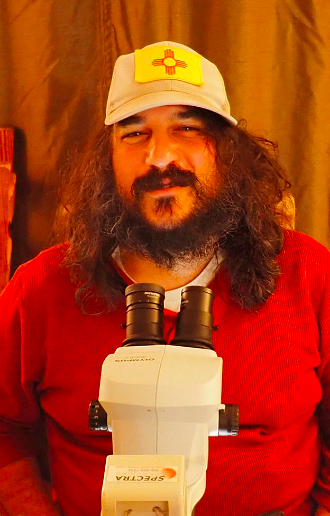By Mia Groeninger
Insects play a crucial role in the restoration and conservation of native plant species, and their relationships with these plants build the foundation for thriving ecosystems. The lives of insects and plants are so unbelievably intertwined.
These tiny creatures we so often try to prevent from entering our homes acutally carry the weight of a healthy ecosystem on their shoulders. They’re responsible for pest control and seed dispersal, to pollination and nutrient cycling. “Without insects and invertebrates, the Botanic Gardens would be like a wax museum of plants and habitats. A tragic, lifeless, uncanny representation of nature,” says Botanic Garden Terrestrial Invertebrate Conservation Ecologist, Zachary Phillips.
Phillips considers Santa Barbara his home. He lived here for 10 years, earned his Bachelor’s degree at UC Santa Barbara, and doctorate from the University of Texas, Austin, in Ecology, Evolution, and Behavior. He claims his interest in insects came from attending “Bug Camp” as a kid. He does warns parents that after going through an educational camp, they might want to study bugs for the rest of their lives like him.

Zachary Phillips at his microscope (Photo Credit: Kipp Callahan)
Phillips spent about five years studying his favorite insect, the leaf-cutter ant, for his PhD in Texas, staying up all night to watch the species and collect data. He learned all about their behavior, different species they interact with, and how they affect the natural environment.
“I fell in love with them. It’s an unrequited love. I killed a lot of ants during my research, so I understand,” Phillips says jokingly.
The Santa Barbara Botanic Garden provides a sanctuary for members of the community to learn about nature and inspires future generations to conserve and restore our natural environment. Garden employees collaborate with local organizations to restore habitats and repopulate species to their native habitats. Exploration through aspects of each habitat also kindles a curiosity in certain scientific fields. The Garden is involved with the scientific community by hiring experts such as botanists, lichenologists, and ecologists who work closely with colleges and research centers.
Phillips, along with the other scientists he calls “bug folk,” also study the relationships between different insects, plants, and their habitats. The conservation of insects affects the wellbeing of humans due to their roles in a variety of ecosystems.
Conserving and restoring insect diversity is crucial in maintaining balance in the environment. Phillips educates the visitors about the impact of insects on our everyday life and how we can work to protect them. He shows people what he calls “cool bugs” and walks around looking under rocks for interesting creatures. “I never met a rock I didn’t want to look under,” he says.
The Garden is a place where there is always something new and exciting to learn about or discover. They also offer organized experiences such as nature walks, camps, and workshops to educate people about restoration and conservation. They also spread bug appreciation, which is apparently lacking. If people do not care about bugs, then how can we protect them?
Mia Groeninger is edhat’s summer intern and is a rising sophomore at Cate School in Carpinteria. Her favorite thing to do in Santa Barbara is spend time at the beach.




